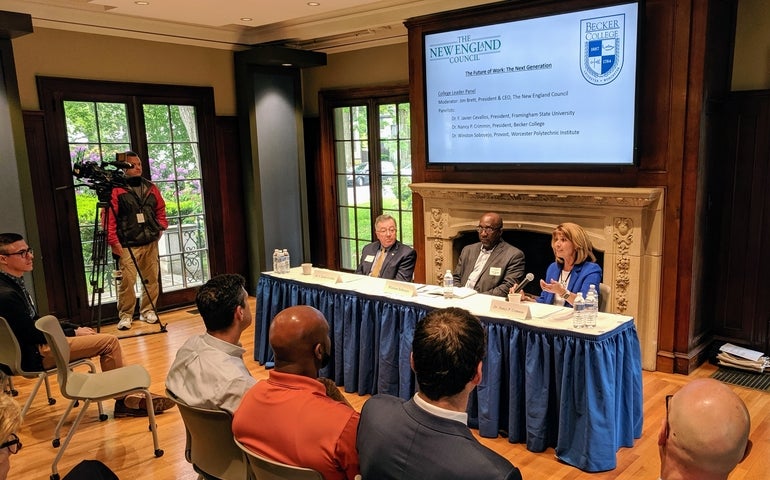With automation and other technological advancements bringing ever-quicker change to workplaces, Becker College has begun considering lifelong learning skills more into its core curriculum and working to give students skills they’ll need no matter what industry they work in.
On Wednesday, Becker President Nancy Crimmin said the Worcester school is giving students more so-called soft skills, like managing change, developing an entrepreneurial mindset, working collaboratively and showing empathy.
The days of working in the same job for many years or the same industry throughout a career are more often gone, Crimmin said at an event Becker hosted to talk about the future of work.
“That’s not typical, at least what we’re finding now,” she said.
Crimmin was joined by U.S. Rep. James McGovern, leaders at Worcester Polytechnic Institute, Framingham State University and others at an event hosted with The New England Council. The question that hung over the event: what will work look like in the coming years, and how can we best prepare for it?
“If we don’t do anything and we simply allow robots to evolve… then we’re likely to be victims of job losses,” said Winston Soboyejo, the WPI provost.
If there’s not yet any sure bets on how to ensure workers aren’t left behind by automation, leaders have ideas for how to make employees as valuable as they can be. Panelists emphasized the need for employees who can shift with workplace demands and have skills that will benefit them no matter their job description.
“Adaptability and agility are the most important,” said Bill Sodeman, the chief learning officer at Seven Hills Foundation.
McGovern, the Worcester Democrat who gave a keynote talk to start the meeting, lamented how many workers are still in part-time or lower-wage jobs despite the strong economy but was more hopeful about automation helping create more jobs, not simply displacing them.
To help with the transition to a more automated workplace, McGovern proposed more federal funding for apprenticeship programs to create more opportunities for entering the workplace, and for tax credits for businesses who pay better wages to workers who go through training programs.
The best answers for supporting a well-trained workforce aren’t likely to come from Washington, McGovern said. But the congressman said he hopes legislators can hold hearings on preparing for the decades ahead and support local initiatives.

